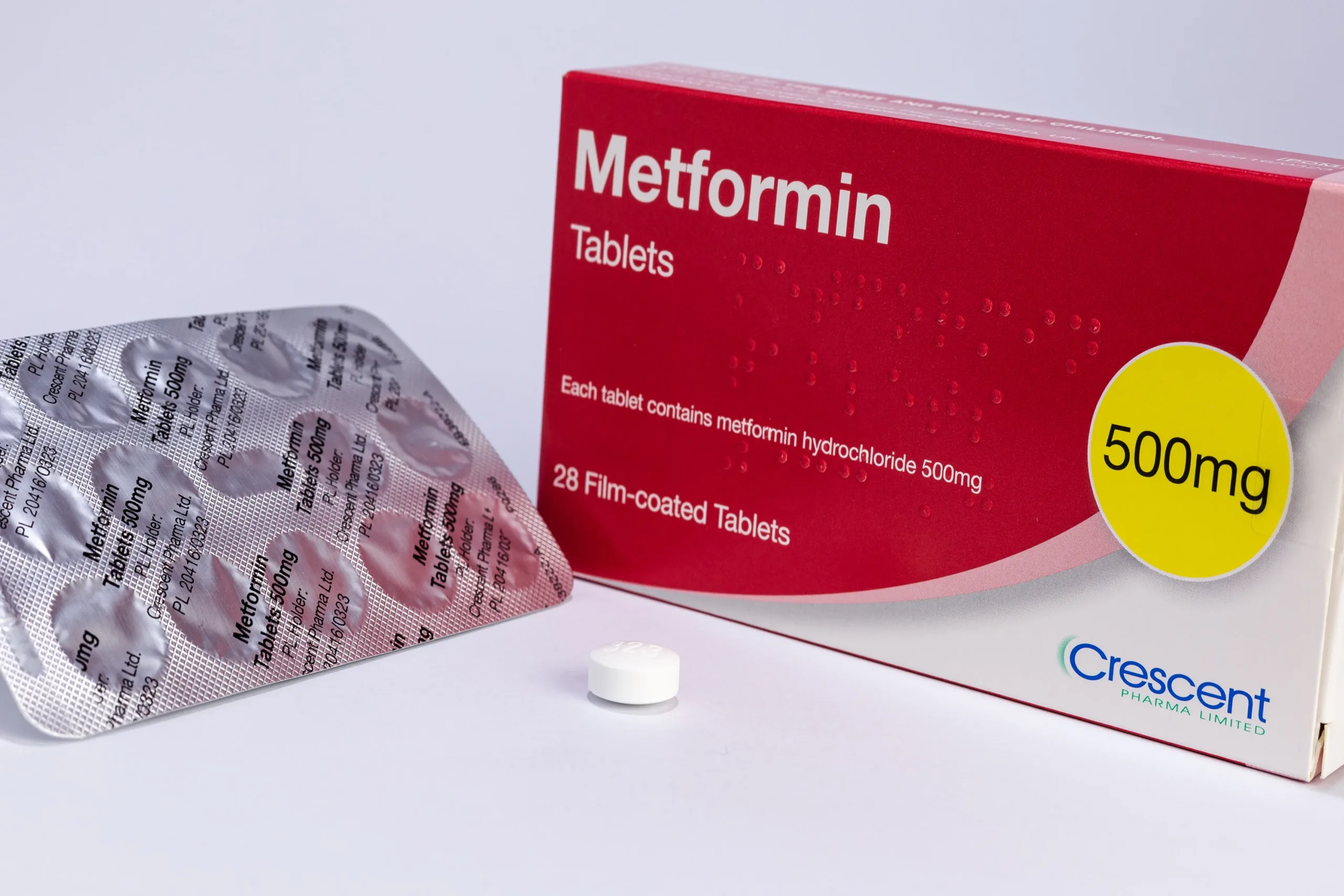New evidence suggests some benefits – only in select groups
.
There is a lot of discussion and hype about the anti-cancer potential benefits of metformin within patient support groups and amoung some complementary practitioners. It is certainly one of the more commonly asked questions among patients attending my integrative oncology practice at UCLH. Fortunately, new information from well conducted clinical studies is providing clarification of who may benefit and who would not – particularly the recent STAMPEDE study and the large MAST study.
.
What is Metformin?
This is an oral tablet (formally known as a biguanide) used in the treatment of type 2 diabetes. In recent years, researchers have been exploring whether it may offer extra benefits for people with cancer – an example of a repurposed drug.
.
The potential anti-cancer mechanisms:
Firstly, and most importantly, metformin improves glucose levels and reduces insulin levels – some cancers have insulin receptors which if activated encourage the cells to grow faster, so reducing excess insulin levels is a certainly a good thing. Metformin, in some laboratory studies, has also demonstrated an ability to directly slow cancer cell growth (anti-proliferative) by inhibiting protein synthesis. Other studies, involving cells in a petri dish or cancers in animals, have found it can help to improve repair damaged DNA or if not possible encourage programme the cells to die (Apoptosis) via activation of the repair gene P53. This means that cells with genetic damage are either repaired or killed – so they can’t grow abnormally – the first step in cancer formation. Metformin can also have a hormonal mechanism of action – It has been shown to help restore sensitivity to hormonal drugs via mTOR pathways.
.
Clinic evidence for metformin and cancer in humans:
These laboratory anti-cancer mechanisms of action, sound impressive, at first glance, but the most of this evidence comes from laboratory studies rather that people with or without diabetes living with cancer. Data from laboratory studies does not always translate into human studies. Here is what we know, so far:
People living with diabetics and cancer – A recent summary of over 80 observational studies, involving over 13,000 patients, found that amoung diabetic patients, who also have cancer, those taking metformin had about 34% better survival compared to those taking other anti-diabetic drugs such as glyclazide – especially for colorectal, lung, uterine and pancreatic cancers (Read study). In women with type 2 diabetes and hormone‑driven cancers such as breast, endometrial, ovarian, metformin users had about a 38% better overall survival compared to those using other diabetes medications (Read more).
Non-diabetics with cancer – A meta‑analysis of 22 randomized trials looked at data involving nearly 6000 non-diabetic cancer patients. After very careful interpretation of the data, they concluded that metformin did not significantly reduce cancer‑related mortality or save more cancer deaths, overall. In subgroup analyses, however, of hormonal cancers (breast, ovary, endometrium, prostate) there may have been a very small benefit, but on the other hand patients with digestive cancers (pancreatic, liver) possibly had worse outcomes after taking metformin (Read more).
Men with prostate cancer not taking hormones – The Canadian Metformin Active Surveillance Trial (MAST) , reported in the Journal of Clinical Oncology, found that metformin did not improve progression-free survival vs placebo in group of 408 patients men with low-risk prostate cancer undergoing active surveillance. Side effects to metformin included diarrhoea (19% vs 8%) and nausea, dyspepsia, and abdominal pain (9% vs 1% each). A concerning finding was that obese men on metformin also progressed faster than obese men not on metformin.
Men with prostate cancer taking hormonal therapies – most robust data comes from the recent STAMPEDE study as it was a prospective randomised trial (The best and most reliable type of evidence). It involved non-diabetic men with metastatic prostate cancer at trial entry controlled with hormones. The researchers found no difference in survival or time to PSA progression between men randomised to take metformin or not. These research findings were published in Lancet Oncology.
This study was not all negative however, as it reported some benefits in counterbalancing the negative effects of the hormones therapies. Men taking metformin, at the two year mark, had significantly lower cholesterol, fasting glucose and waist circumference – These are some of the features of metabolic syndrome, which is often also associated with poor gut health and excess inflammation. Metabolic symptom is associated with an increased risk of diabetes, heart attacks and strokes.
.
Metformin mimicking foods
Some phytochemical rich foods (fruit, veg, herbs, spices) can slow the transfer of sugar across the gut wall and hence reduce insulin surges. This is the reason why intake of whole fruits, which does contain some sugar, reduces rather than increases diabetic risk. These foods also have their own anti-cancer benefits and help improve gut health. People who have better gut health and a high intake of phytochemical rich foods also have a lower cancer risk and a lower relapse rate after cancer treatments. There is some evidence for boosting these in supplement form:
YourPhyto and Yourgutplus: More recently, boosting the diet with a 6 blend fortified phytochemical rich supplement has been shown to slow cancer progression, reduce markers of inflammation, improve urinary symptoms and other markers of health and wellbeing such as grip strength in men with prostate cancer managed with Active Surveillance. What’s more, combining this capsule with a 5 blend lactobacillus probiotic supplement, doubled the benefits of the phytochemicals alone.
Berberine (BRB) is an isoquinoline alkaloid commonly extracted from a medicinal herb, Rhizoma coptidis. It has some interesting potential effects on cancer in cell line studys but there is no robust clinical data to suggest it works in humans. There are some small trials to show that berberine can help patients with diabetes by helping sugar control but also lowering lowering cholesterol.
Cinnamon is an evergreen and tropical plant of the family Lauraceae. There are some trials which suggest Cinnamon can help with diabetic control . In terms of cancer, although it does contain some health phytochemicals there are no human studies of cinnamon to show it helps cancer.
Milk thistle Silibum marianum, and its seeds is rich in flavonolignans. Extracts have been shown to reduce the rate of sugar absorption and improve insulin sensitivity and small studies have shown Milk thistle helps diabetic control but studies showing it helps patients with cancer are lacking. It is said to have some oestrogenic properties to be avoided in patients with breast cancer – although evidence for this is also lacking.
.
My conclusions for the evidence of metformin and cancer benefits:
It must be remembered that some of the same benefits of metformin (particularly reducing insulin levels) can be achieved by exercising more (especially whilst fasting), losing weight, eating more phytochemical rich foods, improving gut health, avoiding processed carbohydrate and sugar.
If you are diabetic and your doctors are considering starting medication, it would be sensible to start metformin rather than other diabetic drugs.
There appears to be no data to support the use of metformin in non-diabetic patients with cancer. However, if you are overweight, it would certainly be wise to ask the GP or cancer care team to test your blood for a Hba1C – this is a marker of sugar control and pre-diabetes. If elevated, I would have a low threshold for starting metformin.
There may be a role for metformin in overweight sedentary men starting androgen deprivation (e.g Zoladex) to prevent adverse side effects. These could also be prevented by referring men to a 12 week exercise and nutritional programme – already a National Institute of Clinical Excellence (NICE) recommendation (though not always initiated). Metformin, however, is not licenced in this setting so it would be worth asking your medical team or GP to measure Hba1C regularly and if it becomes elevated, then have a low threshold to start metformin.
.
References for metformin and cancer:
Ahn HK, Lee YH, Koo KC. Current Status and Application of Metformin for Prostate Cancer: A Comprehensive Review. Int J Mol Sci. 2020 Nov 12;21(22):8540. doi: 10.3390/ijms21228540.
Gillessen, Silke, Attard, Gerhardt et al. Metformin for patients with metastatic prostate cancer starting androgen deprivation therapy: a randomised phase 3 trial of the STAMPEDE platform protocol. The Lancet Oncology, 2025, 26 (8)10.1016/S1470-2045(25)00231-1.
Lemon LS, Orr B, Modugno F, et al. Metformin and survival: Is there benefit in a cohort limited to diabetic women with endometrial, breast, or ovarian cancer? Gynaecol Oncol. 2022;165(1):60-66. doi: 10.1016/j.ygyno.2022.01.022.
Fleshner NE et al Metformin Active Surveillance Trial in Low-Risk Journal of Clinical Oncology 2025. vol 43; 34 https://ascopubs.org/doi/10.1200/JCO-25-01070






Leave A Comment